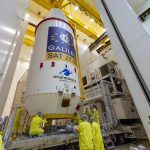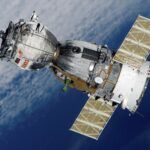February 15, the EU is acting on its space ambitions by tabling two initiatives – a proposal for a Regulation on a space-based secure connectivity and a Joint Communication on an EU approach on Space Traffic Management (STM). Space technology is essential for facilitating our daily lives, contributing to a more digital, green and resilient future for our planet. As a major space power, the EU’s Space Programme already provides valuable data and services for a wide array of daily applications from transport, agriculture, and crisis response to the fight against climate change, to name a few.
However, due to new challenges and increased international competition, the EU’s space policy needs to constantly evolve and adapt if we want to continue enjoying freely the benefits that space brings. Today’s initiatives will help safeguard the efficiency and security of our current assets while developing European cutting-edge space technology to the benefit of our citizens and economy.
Space-based secure connectivity
In today’s digital world, space-based connectivity is a strategic asset for EU’s resilience. It enables our economic power, digital leadership and technological sovereignty, competitiveness and societal progress. Secure connectivity has become a public good for European governments and citizens. The Commission is thus putting forward an ambitious plan for an EU space-based secure communication system that will:
- Ensure the long-term availability of worldwide uninterrupted access to secure and cost-effective satellite communication services.
- Allow for the provision of commercial services by the private sector that can enable access to advanced, reliable and fast connections to citizens and businesses across Europe, including in communication dead zones ensuring cohesion across Member States. This is one of the targets of the proposed 2030 Digital Decade.
The total cost is estimated at €6 billion. The Union’s contribution to the Programme from 2022 until 2027 is €2.4 billion at current prices. The funding will come from different sources of the public sector (EU budget, Member States, European Space Agency’s (ESA) contributions) and private sector investments.
Space Traffic Management
With an exponential increase in the number of satellites in orbit due to new developments in reusable launchers, small satellites and private initiatives in space, the resilience and safety of EU and Member States’ space assets are at serious risk. It is critical to protect the long-term viability of space activities by ensuring that space remains a safe, secure and sustainable environment. This makes Space Traffic Management a priority public policy issue, which requires the EU to act now, collectively and at a multilateral level, if we are to ensure a safe, secure and sustainable use of space for the generations to come.
The EU approach focuses on four elements:
- Assessing the STM civilian and military requirements and impacts for the EU;
- Strengthening our technological capability to identify and track spacecraft and space debris;
- Setting out the appropriate normative and legislative framework;
- Establishing international partnerships on STM and engaging at a multilateral level.
Background
The two initiatives adopted today are concrete deliverables of the Action Plan on Synergies between civil, defence and space industries, where these two flagship projects are mentioned.
Secure Connectivity
To implement this new space-based initiative ensuring secure connectivity across Europe, the Commission launched in December 2020 an initial system study to explore technical aspects and the potential service provision models.
Meanwhile, the Commission published an additional call to also involve the European New Space ecosystem to integrate technologically cutting-edge, innovative ideas by SMEs and start-ups. Two contracts were awarded in December 2021 and the technical work is now ongoing with results expected by June 2022.
Space Traffic Management
Since 2016, the Union already has a Space Surveillance & Tracking capability (SST), implemented by the EU SST Consortium. More than 130 European organisations from 23 Member States have registered so far to the EU SST services (collision avoidance, fragmentation analysis, re-entry analysis). Today, more than 260 EU satellites, including the Galileo and Copernicus fleets, benefit from the collision avoidance service.







Leave a Reply